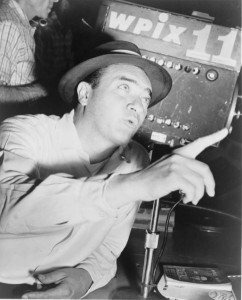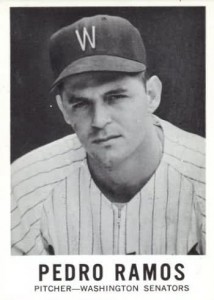Baseball: The Summer of 1960

As a sequel to 1960, let’s take 2019. See “Nats Win!”
Until 2019 I was a frustrated fan of the Washington Nationals, as I was the old Washington Senators. As a New York schoolboy in the Fifties, I’d go up to Yankee Stadium to root for the Senators when they were in town. Always wore my navy blue cap with the white block “W.” Big, scary Bronx voices would shout: “Hey, kid—the Washington section’s in the bleachers.”
The Senators were perennial heartbreakers, although in mid-1952 they were only five games out of first place and considered to be pennant contenders. Known for light hitting and good pitching, they played hard and were usually fun to watch.
By 2012 the Nationals, who returned baseball to Washington in 2005, have been playing great baseball, and there’s reason to hope for “Joy in Mudville” soon. But the first six years were pretty rough. In 2009, another Nats loss again to the Phillies, I did a weird thing. I watched the video on Direct TV while listening to a CD of the New York Yankees game at Griffith Stadium on 5 July 1960, last year of the original Washington Senators. (Found it on eBay.)
Back to 1960
Transported back in time, I heard Phil Rizzuto and Mel Allen (one at a time, no tag-team) call a pitcher’s duel between the Yankees’ Ralph Terry and my hero Pedro Ramos, which the Senators won 5-3 in extra innings. (As Casey Stengel said, “you can look it up.”)
How broadcasts have changed: Allen and Rizzuto called plays and made prescient observations—nothing else. There were no reminiscences of their playing days, no ballgirl interviews with celebrities in the bleachers while the game was going on, no goofy mascots, no songfests, no fireworks, no instant-replay, no strike-zone reviews (the zone was uniform, the umps impartial). Just baseball—pure and elegant, as God and Abner Doubleday intended.
 How the game has changed. Terry and Ramos (chewing a big wad of ‘baccy) each went eight innings. Relief pitchers came in and stuck—were not pulled after one batter because the next guy was batting from the other side of the plate. The phrase “pitch count” didn’t exist. (I realize that since 1980, there is reliable evidence that you can blow a young pitcher’s arm by leaving him in too long.) There were no “Designated Hitters.” From sluggers to pitchers, everybody knew how to bunt and run bases. No balls went through legs or over heads.
How the game has changed. Terry and Ramos (chewing a big wad of ‘baccy) each went eight innings. Relief pitchers came in and stuck—were not pulled after one batter because the next guy was batting from the other side of the plate. The phrase “pitch count” didn’t exist. (I realize that since 1980, there is reliable evidence that you can blow a young pitcher’s arm by leaving him in too long.) There were no “Designated Hitters.” From sluggers to pitchers, everybody knew how to bunt and run bases. No balls went through legs or over heads.
“Rhubarbs” (Red Barber’s term) were similar: José Valdivielso charged the mound when Terry brushed him back (Phil mentioned his “Latin temper,” which he wouldn’t do nowadays.) The next inning Pedro hit Mantle while “Meekie” took his base with a big grin, and the umpire fined Pedro $50 and warned him not to do it again.
Pedro and The Mick
Senators pitchers loved to razz Mantle. In 1956, Mick had hit a Ramos pitch almost out of Yankee Stadium. And it was Chuck Stobbs, the winning pitcher in this game, who had served the ball Mantle hit 565 feet out of Griffith Stadium in 1953, the second-longest home run on record. (The longest was by Babe Ruth, who hit one 575 feet against the Tigers in 1926.)
I was struck by the clean baseball both teams played. Aside from a hit batter and a wild pitch, there were no gaffes. The typical inning ended “nothing across” (a medieval term meaning no Yankee runs or hits and no Senator errors, or vice versa). Hits were scattered, even from the vaunted Yankee lineup. Decisions on relievers, pinch hitters and runners by managers Casey Stengel and Cookie Lavagetto were foxy and smart; nobody could argue with them. The Washington crowd booed José when he charged the mound, knowing Terry wasn’t purposely trying to hit him.
Even the advertising was fun. The sponsors were the Atlantic Refining Company (“Atlantic Imperial, the gasoline that cleans your carburetor as you drive”—remember carburetors?) and Ballantine Beer (“the Crisp Refresher”). There were no ads for patent medicines designed to ward off RLS, DES, PID, HIV or the dreaded ED. Mel and Phil would have been embarrassed to talk about such stuff.
Ah, the summer of 1960. The Yankees went on to win the pennant. The Senators played close to .500 and finished 5th out of eight before packing up for Minnesota. What a wonderful, entertaining game that was—managed, pitched and announced—over a half century ago.







One thought on “Baseball: The Summer of 1960”
I just heard the broadcast…you are so-o-o-o right. Also, in the latter part of the CD, you can hear Charlie Brotman announce Chuck Stobbs as the batter…no screaming, no hype, just classic Brotman…I love it!!!
Comments are closed.